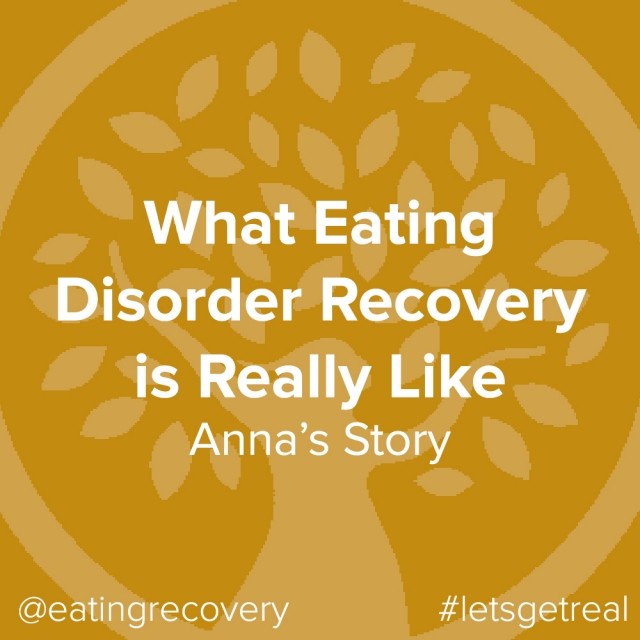Let’s Get Real About Recovery in Day-to-Day Life – Anna Z.
Author:
Anna Z.

Recovery truly is a full-time job for our bodies and our minds.
When I think about eating disorder recovery in my day-to-day life, I think about the tiny moments throughout my journey which have added up to create large strides of progress in my recovery. I’d like to share some of the things I’ve learned.
Recovery is extremely hard
First and foremost, it became apparent to me that recovery was going to be absolutely exhausting and arduous. I realized that it would be difficult to maintain momentum when each day felt like I was literally at war with my own mind.
Upon leaving an eating disorder treatment center for the first time, I remember thinking this: I would come home, implement my meal plan into my daily life, continue on with my goals, and embrace my world in this new “recovery” mindset.
I quickly learned that this thinking was a bit naïve. I realized how much work it was actually going to take for me to follow the recovery process and begin to live a life geared towards my true values — and away from those of the eating disorder.
Recovery is exhausting
Something that was quite surprising to me during the early recovery process was just how physically exhausted my body was. Even though I was finally eating the correct amount of food and moving my body in ways that made me feel good — rather than being driven by the eating disorder — I often felt exhausted and needed a lot of rest.
I learned that I could not let the eating disorder seep through the cracks. If I gave the eating disorder an inch, suddenly it stole a foot — and playing the game of “catch up” in recovery is not a fun one.
Recovery requires self-compassion and rest
As a driven person, I found myself in the “go, go, go” mentality, and it was difficult to make a conscious effort to give my body some grace to allow it to heal on the inside. Yes, I was weight-restored, but that didn’t mean that all of my internal organs and physiological functioning didn’t need time to heal and to adjust to this new body that was finally getting the nourishment it needed.
Recovery must always be the top priority
I am a high-achiever and it is common for me to fill my schedule to the brim with work, school, and other commitments. I think this really plays into the difficulty of recovery on the outpatient level: life is demanding and will be even more so if I always have deadlines to meet and tasks to complete.
It was easy to feel like I simply didn’t have the energy to battle the eating disorder in my busy day-to-day life. When I fell prey to this belief, I learned — through relapse — that recovery had to always be #1 on my to-do list — if I wanted to be around for any of the other things on that same to-do list.
Recovery is strengthened with continued care
One of the things that had a most powerful impact on my recovery process was continuing with outpatient eating disorder treatment. I was lucky to have a treatment team that I trusted wholeheartedly, even after being discharged from the eating disorder treatment center.
When I was away at treatment, I felt as though I had support and was being held accountable almost 24/7. This level of care allowed me to not only restore and learn to nourish my body physically, but provided me with many tools necessary to continue my recovery on my own turf.
Once that 24/7 support ended, having an outpatient treatment team to check in with on a consistent basis held me accountable to my recovery, provided me with space to continue to grow in my recovery, and challenged some of my remaining eating disordered behaviors and beliefs.
Recovery requires support
In addition to working with my outpatient treatment team, I had to learn how to “let people in.” I had to allow some of my loved ones to support me and hold me accountable. These support people served as both listening ears when things got tough and as cheerleaders for even the smallest of successes.
Over time, I was able to take the lessons I learned in treatment — and the messages that my tribe of support people and my outpatient team instilled in me — and carry all of that knowledge with me always; especially in the moments when I was really struggling and feeling isolated.
Recovery is making the "next right choice"
Recovery from an eating disorder comes down to many, many everyday choices. I have learned that if I stumble it doesn’t mean that I am automatically destined for relapse. I always have the opportunity to “make the next right choice” and bring myself back to the path of recovery.
In everyday life, we are faced with so many messages from society and the media about how we are “supposed” to be living, but it is imperative that we look at those messages with skepticism and take them with a grain of salt, while relying on the messages that we are taught from our treatment team and our support people to continue the walk of recovery.
Struggling with an eating disorder?
One conversation can make all the difference. Connect with us today.
Get Help NowConnect With Us

